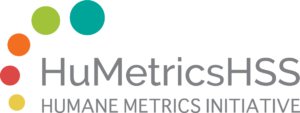In Aristotle's Nicomachean Ethics, there is a famous passage in which he reminds us that "to be happy takes a complete lifetime; for one swallow does not make a spring, nor does one fine day; and similarly one day or a brief period of happiness does not make a person blessed and happy" (Nic. Eth., 1098a16–20).
This passage came to frame our conversations around #HuMetrics at this week's Triangle Scholarly Communications Institute, because it reminds us that a fulfilling life — what Aristotle calls, eudaimonia, happiness, that is, a life well lived — requires cultivated habits rooted in core values that, when intentionally practiced, shape the character of a good life.
In the end, what we value should be embodied in what we do, not once or twice, but regularly over the course of a lifetime.
In framing our conversation about #HuMetrics with this ancient conception of ethics, excellence, and character, we seek also to advance and reinforce the idea that a scholarly life can only be well lived in communities of practice with others.
For the #HuMetrics team, this year’s Triangle SCI experience was a swallow that signifies but does not yet fully manifest the coming spring. It opened for us a space for the flowering of a community of practice oriented toward the question of how we might more broadly cultivate communities of practice that embody the values of fulfilling scholarly lives.
Five Core Excellences of Enriching Scholarship
Working out loud together, we identified five core excellences of enriching scholarship:
Rebecca Kennison wrote about Equity.
Simone Sacchi wrote about Openness. His point was amplified further by Rebecca in her post about The Value of Openness.
I wrote about Collegiality.
In writing together in this way, we seek to embody the excellences for which we advocate.
The question that animates our work is this:
Can we develop more humane indicators of thriving colleagues in enriching communities of practice? #Humetrics #TriangleSCI pic.twitter.com/jwmIevjORc
— Chris Long (@cplong) October 13, 2016
The Winter of Our Discontent
For too long, we humanists have been allergic to metrics. This allergy has prevented us from engaging in a serious and sustained conversation about what practices of scholarship we might want to cultivate and incentivize both through the activities we measure and those we celebrate.
As a result, a large and growing battery of metrics have been developed based on the practices of more scientifically oriented scholarship or simply on what it was possible to use our technologies to measure.
Current metrics of humanities scholarship have been shown to be too blunt to capture the multiple dimensions of scholarly output and impact (see Haustein and Larivière). In addition, the inappropriate nature of current indicators can incentivize perverse scholarly practices (see The Metric Tide, Wilsdon et al.).
A critical component of our emerging #HuMetrics conversation at Triangle SCI involves finding ways to expose, highlight, and recognize the important scholarship that goes into the all-too-hidden work of peer review, syllabus development, conference organizing, mentoring, etc. Our current metrics fail to capture what is most substantive about the rich life of scholarship we practice together in living academic communities.
In this context, our challenge and our responsibility is to articulate, incentivize, and reward practices that enrich our shared scholarly lives and expand our understanding of scholarship itself.
Without being naïve about how difficult it is to change culture, we hope to begin to reshape the conversation about metrics around the values of enriching scholarly practices and the communities in which they thrive.
Although our time together at the Triangle SCI was only one swallow that does not yet make a spring, the seeds planted there may begin to take root over the weeks and months to come, and the communities of scholarship that blossomed there just might be "made glorious by this sun" that shines when a broader public is invited to join the conversation.

Hello,
I’m following your work with interest since we have been attempting the same in health professions education (HPE – i.e. subfield of Education) re: what are the aims of HPE, what impacts do we have, and what are the most ALIGNED metrics that could be used to assess (and/or improve) our impacts?
We published a work proposing some “grey metrics” and how to actually present impact not as piecemeal stats, but as a story that expresses how we address our goals, vision, and aims (aware that many others champion use of stories – from Mark Reed @ Fast Track Impact to ostensibly what REF wants to see with case studies, but we often find people still end up writing sentences that are disparate achievements that do not tell a story — your field will likely be the best at this!)
BUT we have found in trying to track/evaluate other forms of impact, it is very resource consuming.
Would love to engage re: how to do this given resource constraints.
journals.lww.com/academicmedicine/Fulltext/2019/07000/Approaching_Impact_Meaningfully_in_Medical.24.aspx or email Farah.Friesen@unityhealth.to if your institution does not have access.
All the best and hope you are all well and healthy during these times. (Comments my own, not reflective of my colleagues, department, nor institution)